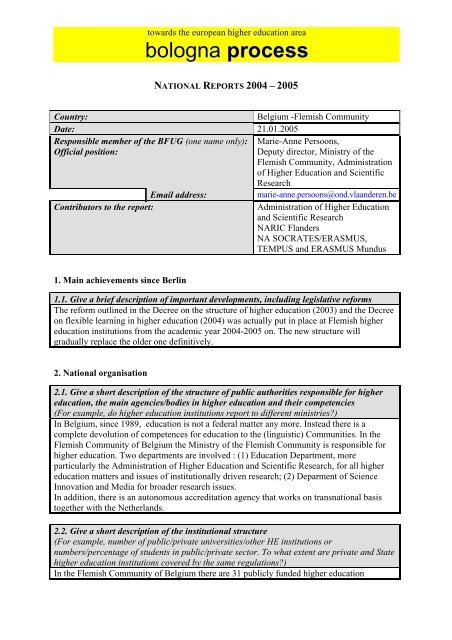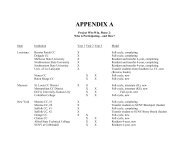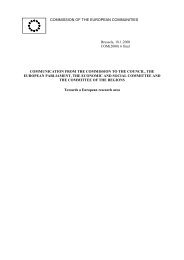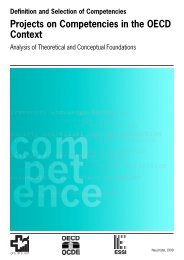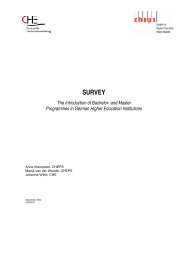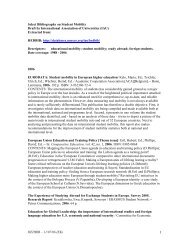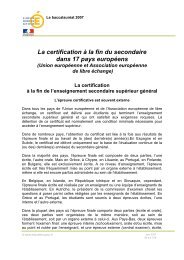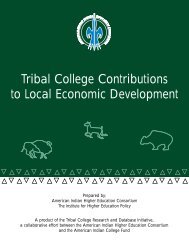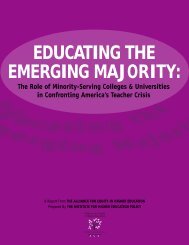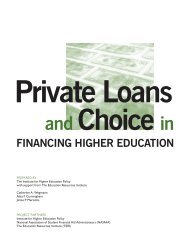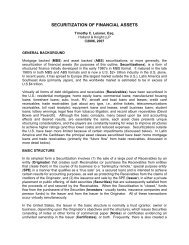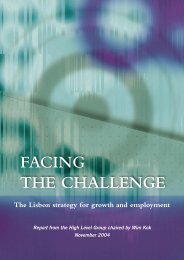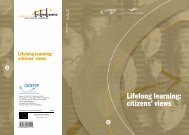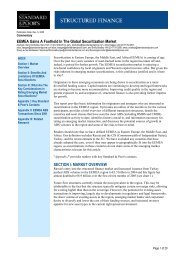Belgium -Flemish Community - European Higher Education Area
Belgium -Flemish Community - European Higher Education Area
Belgium -Flemish Community - European Higher Education Area
Create successful ePaper yourself
Turn your PDF publications into a flip-book with our unique Google optimized e-Paper software.
A university or hogeschool asks a quality assessment agency (<strong>Flemish</strong> InternuniversityCouncil or <strong>Flemish</strong> Hogeschool Council) to carry out an evaluation and peer reviewaccording to its protocols, which meet the requirements of the accreditation agency. Programmes carry out a self-assessment and produce the self-assessment report thatwill be transmitted to the review panel. The actual external review and site visit take place. At least six months before the previous accreditation for a programme comes to anend, the institution submits a request for a new accreditation that includes its self-assessmentreport and a recent (not more than one year) external quality assessment report. The accreditation organisation examines the report and takes a decision within threemonths following the request. Before the decision is formally confirmed it is presented to theinstitution, which has two weeks to react. The accreditation organisation publishes its decision. Accredited programmes will be listed in the official "higher education (programmes')register".In total, the process will take about a year and a half. Legislation stipulates that accreditationis granted to a programme for a period of eight years.Institutions have the legal right of appeal to accreditation decisions in court.3.3. National quality assurance systems should include international participation, cooperationand networking.Are international peers included in the governing board(s) of the quality assuranceagency(ies)?Since the systematic introduction of quality assurance mechanisms in higher education(Decree on Universities 1991 and Decree on Hogescholen 1995), the framework allowed theintegration of international cooperation in the peer reviews. The evaluation boards usuallyhad a composition with at least one foreign expert (often from the Netherlands). Also severaltransnational peer reviews were set up involving the evaluation of programmes from both theNetherlands and the <strong>Flemish</strong> <strong>Community</strong> of <strong>Belgium</strong>. Under impuls of the Bologna process,the quality assurance system was extented to accreditation procedures and from the firstpreparatory action, cooperation was sought with the Netherlands, resulting eventually in twocomparable accreditation systems in the two countries and the establishment of a joint Dutch-<strong>Flemish</strong> accreditation agency (formally in operation since 2004). This agency hasinternational cooperation in its mission statement. Dutch-<strong>Flemish</strong> cooperation initiated theJoint Quality Initiative (in the framework of which the so-called "Dublin descriptors" forbachelor and master level programmes were developend) and also played an important rolein the establishment in 2003 of the <strong>European</strong> Consortium for Accreditation (ECA). ECAfunctions as a platform in preparation for future automatic mutual acceptance of accreditationdecisions of its members and has recently agreed on a code of good practice in the light of itsmain objective.It has to be noted that the Decree on the Structure of <strong>Higher</strong> <strong>Education</strong> leaves the possibilityfor the acceptance of quality judgments by foreign quality assurance and/or accreditationbodies.Please add any general comments, reflections and/or explanations to the material on qualityassurance in the stocktaking report.The Dublin Decriptors, defined by the JQI for bachelors and masters, are integrated in theDecree on the structure of higher education (2003) as minimum requirements for bachelor4
and master degrees.4. The two-cycle degree systemThe two-cycle degree system is covered by the stocktaking exercise. Please add anycomments, reflections and/or explanations to the stocktaking report.See charts in annex.5. Recognition of degrees and periods of studyRecognition of degrees and periods of study is covered by the stocktaking exercise. Pleaseadd any comments, reflections and/or explanations to the stocktaking report.MUTUAL ACCEPTANCEIn the <strong>Flemish</strong> <strong>Community</strong>, the awareness is growing that the concept of "recognition"should be made operational through the introducation of mutual acceptance of degrees basedon quality judgments and/or accreditation decisions of quality assurance and accreditationbodies that meet the commonly shared <strong>European</strong> (and wider international) standards.NEED FOR A EQFNARIC Flanders functions as a part of the <strong>Education</strong> department and is i.a. in charge ofrecognition issues. It welcomes the planned establishment of an overarching qualificationframework for higher education and believes strongly that this will lead to a more flexibleattitude to recognition across Europe.ECTSA <strong>Flemish</strong> credit system based entirely on the ECTS has been applied to universityprogrammes since 1991 and to non-university higher education programmes since 1994. Thenew Decree on the Structure of <strong>Higher</strong> <strong>Education</strong> (2003) endorses the compatibility of theexisting credit system with ECTS.LISBON RECOGNITION CONVENTIONAs soon as <strong>Belgium</strong>, as a federal state, has signed the Lisbon Recognition Convention thisConvention will immediately apply in Flanders. However, on 17 July 2003 the <strong>Flemish</strong>Government already officially approved the Lisbon Recognition Convention and theprinciples of the Lisbon Recognition Convention were incorporated in the 2003 Decree onthe Structure of <strong>Higher</strong> <strong>Education</strong>.DIPLOMA SUPPLEMENTIn Flanders a compulsory Diploma Supplement has been awarded automatically at universitylevel since 1991 and at non-university level since 1994.In combination with the credential itself, the <strong>Flemish</strong> Diploma Supplement providedinformation on the nature, level, content and status of the studies that were pursued, togetherwith a description of the <strong>Flemish</strong> higher education system.The Council of Europe, UNESCO and the <strong>European</strong> Commission recognised the <strong>Flemish</strong>Diploma Supplement as a ‘good practice’ and jointly created in 1998 an international modelsimilar to the <strong>Flemish</strong> Diploma Supplement.The 2003 <strong>Higher</strong> <strong>Education</strong> Act endorsed the concept of a Diploma Supplement and the<strong>Flemish</strong> Diploma Supplement is now adapted to the international one. Students may now5
apply for a English version of the Diploma supplement (in addition to the Dutch version)which is delivered free of charge.6. Doctoral studies and research6.1. Give a short description of the organisation of third cycle studies(For example, direct access from the bachelor level, balance between organised courses,independent study and thesis)Access to doctoral studies can in principle be granted after completion of the masterprogramme. Doctorate degrees can only be obtained at universities and are research-related.Candidates are admitted on individual basis, taking into account the quality of their researchproposal. Universities may require that the doctorate students takes some courses (doctoraltraining programme) in addition to carrying out his/her research project.6.2. What are the links between HE and research in your country?(For example, what percentage of publicly-funded research is conducted within HEinstitutions?)PUBLIC/PRIVATE FUNDINGPublic funding in the Flanders consists of 6 major funding streams:- core funding of universities for teaching and research;- an agency for basic university research (research council)- an agency for strategic basic research (not limited to the universities);- an agency for technological and industrial research and development;- 3 technological institutes (information technology, biotechnology and energy andenvironmental technology);- contractual socio-economic research and policy research.According to the most recent statistical data available (reference year 2001) Flandersspended 2.5 % of its GDP in research and development, of which 0.6 % from public sourcesand 1.9 % from public sources.The <strong>Flemish</strong> Governement has, however, committed itself to apply the standard proposed bythe Barcelona <strong>European</strong> Council to spend 3 % of the GDP for research and development. Theobjective is that the public sector would contribute by 1/3 and that 2/3 would be providedthrough private sources.There are no reliable statistical data available on the actual share of the universities in thesepercentages. Due to their frequent collaboration with industry their research they can -according to the nature of the project - be funded by public sources, private sources or amixture of both.ASSOCIATIONS BETWEEN UNIVERSITIES AND HOGESCHOLENAn important step in order to strenghten the link between research and teaching at all highereducation institutions, was the establishment of so-called "associations", i.e. consortia of auniversity with other higher education institutions. Master degrees can only be delivered by anon-university institution in the context of such association.QUALITY ASSURANCEThe accreditation system will only address programmes and will thus cover only theeducational functions of universities and hogescholen. However, since both the <strong>Flemish</strong>Interuniversity Council and the <strong>Flemish</strong> Hogeschool Council evaluation and peer review6
10. Developments in lifelong learning10.1. What measures have been taken by your country to encourage higher educationinstitutions in developing lifelong learning paths?Decree on flexible learning in higher education (2004) was a major step forward. Theestablishment of a credit accummulation system is expected to create more flexibility forlearners, especially those combining their studies with professional and/or family duties.The <strong>Flemish</strong> Government offers financial incentives to higher education institutions adaptingtheir programmes to the needs of adult learners. In this context, at institutional level, pilotprojects for work based learning in the framework of higher education and specific e-learninginitiatives, have been set up.10.2. Describe any procedures at the national level for recognition of priorlearning/flexible learning pathsSee also 10.1.Decree on flexible learning in higher education (2004) creates a legal framework for thevalidation of prior learning and/or professional experience in two cases :- access to higher education programmes- shortening of study duration.PROCEDUREEach "association" (see section 2.2) has to install an agency for the validation of priorlearning1. Applicants have to introduce a portfolio presenting prior learning experiences.2. Assessment by the validation agency of the "association" taking into account the learningoutcomes of the programme applied for.3. Issuing of a competence certificate.11. Contribution to the <strong>European</strong> dimension in higher education11.1 Describe any legal obstacles identified by your country and any progress made inremoving legal obstacles to the establishment and recognition of joint degrees and/or jointstudy programmesThe 2003 Decree on the Structure of <strong>Higher</strong> <strong>Education</strong> legalised joint programmes, doubledegrees and joint degrees. <strong>Higher</strong> education institutions may organise joint programmes andallow their students to follow education at another higher education institution as being partof their Bachelor or Master programme.<strong>Higher</strong> education institutions may award a <strong>Flemish</strong> degree (Bachelor or Master) togetherwith a state recognised degree from a (or several) partner higher education institution(s)taking into account certain administrative conditions.<strong>Higher</strong> education institutions may award a joint degree with one or more foreign highereducation institutions. And in case this joint degree is not a “Bachelor” or “Master”, the<strong>Flemish</strong> degree Bachelor or Master on top of it.11.1.1. Describe the extent of integrated study programmes leading to joint degreesor double degreessee 11.1 and 11.2 (transnational university). Multiplicator effect as a result ofERASMUS Mundus (see 7.2)11.1.2. How have these programmes been organised? (joint admissions, mobility ofstudents, joint exams, etc.)9
see 11.1 and 11.2 (transnational university)11.2. Describe any transnational co-operation that contributes to the <strong>European</strong> dimensionin higher educationSee also under the section of quality assurance : cooperation between the Netherlands and the<strong>Flemish</strong> <strong>Community</strong>.The “transnationale Universiteit Limburg (tUL)” is a recognised university providingtransnational education. The tUL got his legal status by the international Agreement betweenFlanders and the Netherlands signed in Maastricht on January 18, 2001 and ratified by the<strong>Flemish</strong> decree July 13, 2001. The 2003 Decree on the Structure of <strong>Higher</strong> <strong>Education</strong> entitlesthe tUL to award Bachelor and Master degrees which are automatically recognised inFlanders and the Netherlands.11.3. Describe how curriculum development reflects the <strong>European</strong> dimension(For instance foreign language courses, <strong>European</strong> themes, orientation towards the <strong>European</strong>labour market)<strong>Higher</strong> education institutions are autonomous for curriculum development. However, thelegal framework facilitates international (joint) curriculum development and adaptation ofthe programmes to <strong>European</strong> standards, requirements or professional directives.12. Promoting the attractiveness of the <strong>European</strong> <strong>Higher</strong> <strong>Education</strong> <strong>Area</strong>12.1. Describe actions taken by your country to promote the attractiveness of the EHEASee also par. on mobility (i.a. multiplicator effect of the successful participation inERASMUS Mundus) and on joint degrees.Specific measures to suit the needs of foreign students, including organisation of (mostlypostgraduate) programmes in widely spoken languages, and offering foreign guest professorsthe opportunity to teach in a widely understood language.The Decree on the Structure of <strong>Higher</strong> <strong>Education</strong> creates a framework in which HEinstitutions can seek for quality judgments from foreign QA and accreditation organisations,including organisations outside Europe, thus enhancing their visibility and trustworthiness ona global scale.13. Concluding comments13.1. Give a description of your national Bologna strategiesAs the general framework has been set up and the implementation started this academic year,the main focus will be on the deepening on the process.13.2. Give an indication of the main challenges ahead for your countryIn the context of what was mentioned in the previous paragraph, the main challenge will beto raise the awareness for the Bologna process up to the level of the individual HE institutionstaff member and student. Other issue is the enhancement of the competetiveness of thehigher education institution by the adaptation of their funding system, for which a draftDecree will be prepared in the course of 2005.10


